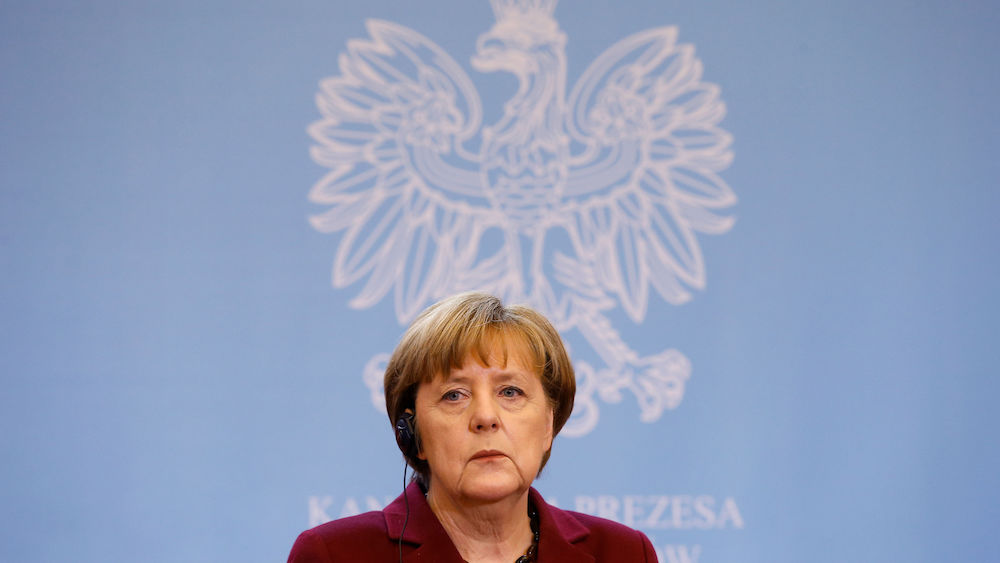Germany and Poland have much to gain from each other – and both countries’ leaders are trying to make the most of their relationship. But important questions about democracy and European unity are getting in the way.
With a disarming kiss of the hand, Jaroslaw Kaczynski, Poland’s most influential bachelor, greeted Chancellor Angela Merkel to Warsaw on Tuesday.
The meeting between the German leader and the head of Poland’s ruling Law and Justice (PiS) party was the main event of Merkel’s day in Poland, after warm-up meetings with the prime minister and president, both loyal Kaczynski appointees.
As PiS leader Kaczynski holds no government portfolio, but he doesn’t need one to steer policy. No one knows that more than Merkel. It’s her second time dealing with Kaczynski after his brief but eventful spell as prime minister a decade ago. Their last co-operation marked a low point in modern German-Polish relations, but this week the two wily leaders appeared willing to leave the past in the past.
This is no love match but a marriage of convenience, an alliance between two tacticians desperately in need of a post-Brexit strategy.
On paper, there is much that unites Germany and Poland. The largest of the original EU members and its eastern neighbor, the largest of the newer members, have a combined population of 119 million people – 16 percent of the EU total. The two countries have annual bilateral trade ties worth a staggering €90 billion and, after past stumbles, are largely on the same page on energy, defense and security.
They are united by a terrible history – the Nazi occupation of Poland and the murder of around six million Poles (half of them Polish Jews perishing in the Holocaust) – but that past is yet another decade further away since 2006.
Kaczynski knows his political strategies – his warnings of a Fourth Reich Germany, for example – are not the vote-winners they used to be. Quite the opposite: in the current stand-off over Ukraine, he knows (and he knows his voters know) that Berlin is Warsaw’s best insurance against Russia.
It’s a remarkable shift in the post-communist era, when Poland traditionally looked to the United States as its strongest defense ally. But Warsaw officials are alarmed at President Donald Trump’s mixed and at times downright warm signals to Russia’s Vladimir Putin.
There is no mistaking where Merkel’s Germany stands on Russia and Ukraine. Berlin is concerned about Putin’s designs on his immediate neighbors, and in Warsaw on Tuesday, the chancellor insisted that an incomplete Minsk agreement must mean continued EU sanctions against Russia.
Kaczynski may not like Merkel but he knows a strategic opportunity when he sees it. The German chancellor is no different. Both Germany and Poland will miss the British terribly. With London-less summits on the near horizon, they see a tactical advantage in each other.
With Britain in the departure lounge, and France in presidential election mode, Warsaw is open for business. Of course, they are not ideal partners; there is disagreement about EU reform in particular. For Warsaw, the lesson of Brexit is an urgent need to rewrite EU treaties and repatriate powers to capitals, giving people back control. Berlin insists that reopening EU treaties is like opening Pandora’s Box, paralyzing the EU just when it needs to keep moving, while more power for capitals means more vetoes.
Danger Lurking
But there is a greater danger lurking in Merkel’s pragmatic approach to Poland. Since taking office in November 2015, PiS has sparked huge controversy for bringing state media under its direct control and undermining legislative oversight from the constitutional tribunal in a row over judicial appointments and court rulings. Brussels has launched an investigation into the state of Polish democracy amid fears PiS is pushing the country toward an illiberal, autocratic democracy.
Warsaw has until February 21 to respond to commission concerns of a “clear risk” to the rule of law in Poland. It’s the next stage in a complicated legal procedure that, technically at least, could end in sanctions. PiS insists there is no problem anymore with the constitutional tribunal, following the recent retirement of its PiS-critical head judge, and that the stand-off was about facing down opposition-loyal forces.
But at a press conference on Tuesday, Chancellor Merkel stressed the importance of a pluralist society, and an independent judiciary and media. Following that, she met with opposition politicians who occupied the Sejm parliament for a month over Christmas after the PiS government excluded them from the budget vote in December.
But is Germany prepared to keep up the pressure on this front or, for pragmatic and tactical reasons, ready to park the EU’s rule of law probe into Poland?
The risk-benefit calculation hinges on how reliable Berlin thinks Kaczynski can be as a partner – and how much they think he has changed. In a revealing interview with the Frankfurter Allgemeine daily just before Merkel’s visit, Kaczynski revived the Polish victim complex, describing his country as a “post-communist, post-colonial” pawn of Russia and the West. The EU is a “monocentric” plaything of Germans, liberals, and lawyers, with Germany “absolutely left” – which may come as news to center-right Angela Merkel.
Most worryingly, he appeared to view EU fundamental rights as a moveable feast. “Nobody has the right to tell us how we regulate marriage or how we stand on sexual orientation,” he said. He railed against EU liberals, accusing them of hypocrisy for imposing on those with different views a “radical limitation of freedom of speech and religious belief.”
Merkel has spotted the tactical gain in working with Kaczynski’s Poland. But tactics are no substitute for a long-term strategy. Quite the opposite: a German marriage of convenience with this Poland could see Berlin acting as unwitting enabler to Warsaw’s powerful, hand-kissing bachelor.







